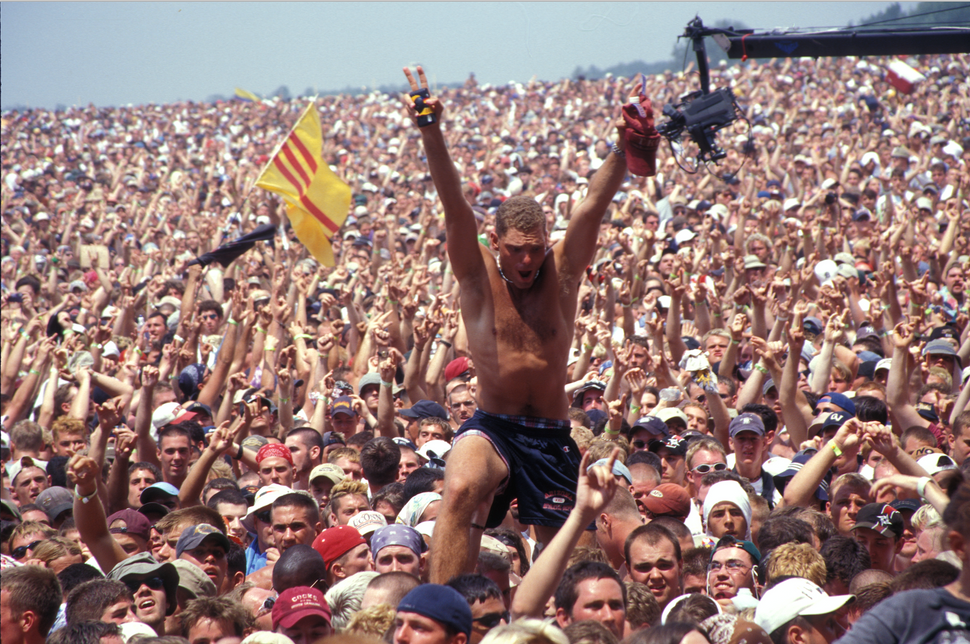A Jewish guide to watching HBO’s harrowing ‘Woodstock 99’

Woodstock 99 By Getty Images
You learn a lot about what went horribly wrong with the Woodstock 1999 festival from the new HBO documentary, “Woodstock 99: Peace, Love, and Rage.” You learn about the inadequate precautions taken to secure the festival grounds at a decommissioned air force base in upstate New York; the blazing, 100-degree heat with sun baking asphalt grounds that offered no shade; rivers of sewage that overflowed from the portable toilets; and most notoriously, the unusually aggressive, testosterone-fueled behavior of an element of the crowd that led to violence and sexual assaults and, by the end of the three-day event, the wholesale and mindless destruction of much of the infrastructure, including the destruction of fences and fires that burned lighting towers, vehicles, vendor booths, merchandise tents — pretty much anything that could fuel a bonfire. A festival of peace and love this was not.
But what you will not learn from the documentary is how, just as in the original Woodstock Music and Arts Festival in 1969, the stage was scattered with Jewish artists throughout the weekend. The visionary behind the original Woodstock festival, Brooklyn-born NYU-dropout Michael Lang, was once again the co-promoter of the event, as he was five years earlier for the 25th anniversary Woodstock ’94 festival, which also suffered logistical problems but nothing like the scene of terror at Woodstock ’99. Rolling Stone magazine called the disastrous event “a master class in how to not schedule a festival lineup” and “one of modern concert-going’s biggest debacles.”

At the end of the Festival: Trash from the Woodstock ‘99 festival. By Getty Images
The original Woodstock festival featured at least a minyan of Jewish performers onstage. The lineup at Woodstock ’99 featured dozens more artists overall, and with that wider talent pool from which to draw, it would have been easier to come up with the minimum Jews necessary to say Kaddish at a prayer service. It could have included some of the following:
3rd Bass: One of the first interracial hip-hop groups, 3rd Bass was led by Michael Berrin aka MC Serch, who grew up in Far Rockaway, Queens. The trio had a big hit with their takedown of Vanilla Ice, “”Pop Goes the Weasel”“
Mickey Hart/Planet Drum: Flatbush-born Michael Steven Hartman aka Mickey Hart, best known as a drummer and percussionist for the Grateful Dead, performed with his world-music outfit Planet Drum.
Counting Crows: Frontman Adam Duritz boasts Russian-Jewish ancestry. Both his parents are doctors. He must be such a disappointment to them.
Robby Krieger: Hard-rock group Creed had former Doors guitarist Robert Alan “Robby” Krieger join them onstage for a version of the Doors’s “Roadhouse Blues.” It’s not clear if anyone in the audience knew who the Doors were—or that they did not perform at the original Woodstock.
Los Lobos: Philadelphia-born Steve Berlin is the only non-Mexican member of the great roots-rock outfit from East Los Angeles. He handles saxophone, keyboards, and production duties for the group.
Mickey Raphael: Michael Siegfried “Mickey” Raphael is the longtime harmonica player for Willie Nelson’s band, which unaccountably was included in a festival lineup almost exclusively devoted to hard-rock acts.
Bush: Gavin Rossdale, whose family name was originally Rosenthal, was the founder and frontman of this British grunge-rock outfit. In 2000, Rossdale famously recited the Motzi blessing at a Friday-night concert in Austria as a protest against that nation’s newly elected right-wing government.
Rusted Root: Liz Berlin was barely out of high school when she began writing songs with Rusted Root cofounder Michael Glabicki. Berlin’s father, Rick Berlin, credits his daughter with inspiring him to attend the Jewish Theological Seminary in New York to become an ordained cantor. While Glabicki is not Jewish, he once told an interviewer, “My sister converted to Judaism…. She married a Jewish guy, so I’ve been to some of the ceremonies. I love it and I think it’s a great community kind of feel. I was at their daughter’s bat mitzvah and it was beautiful.”
Guster: The three founding members of Guster — Adam Gardner, Brian Rosenworcel, and Ryan Miller — are all Jewish. They met at Tufts University when they were first-year students. Gardner was also in a band called the LeeVees, which made an album called “Hanukkah Rocks” for Warner/Reprise Records in 2005.
Jamiroquai: This English neo-soul band was founded by Jason Kay, whose Jewish mother, Karen Kay, was a cabaret singer.
Megadeth: While Megadeth founder Dave Mustaine’s family were Jehovah’s Witnesses, his mother, Emily David, was of German-Jewish descent. The thrash-metal band’s guitarist, Marty Friedman, is also a member of the tribe. Mustaine was the original guitarist for Metallica, who were also featured at Woodstock ‘99.
Seth Rogovoy is a contributing editor at the Forward. He often mines popular culture for its lesser-known Jewish stories.
.






















